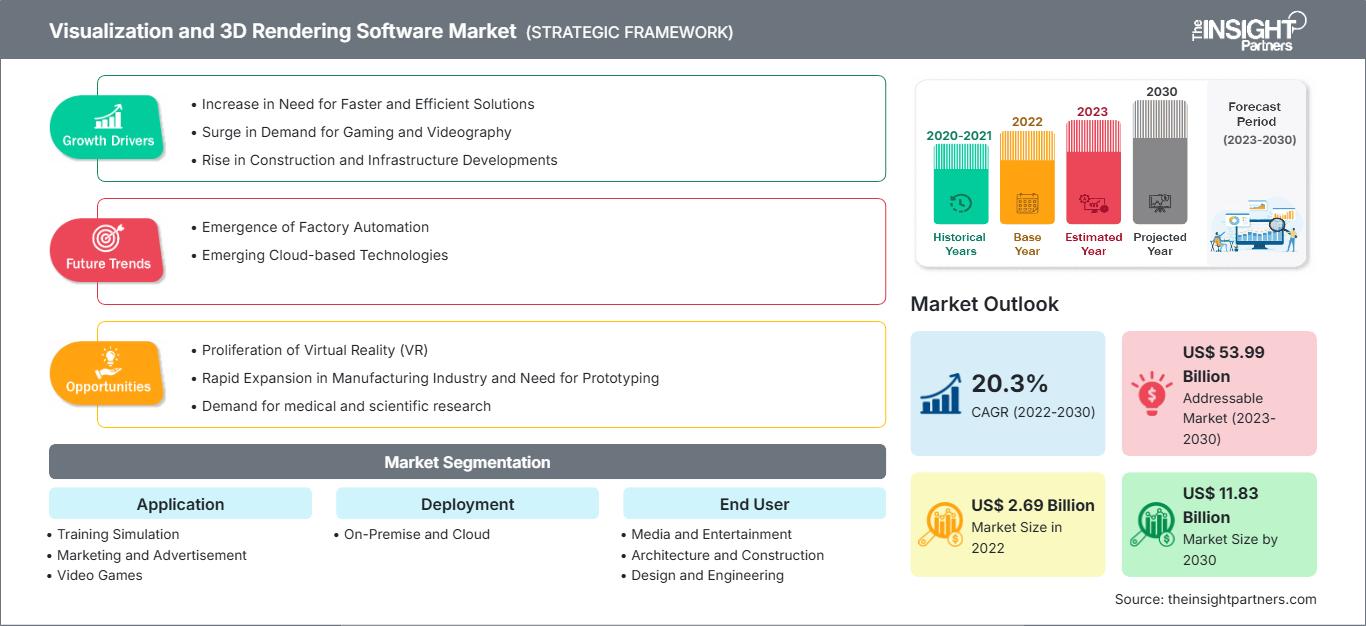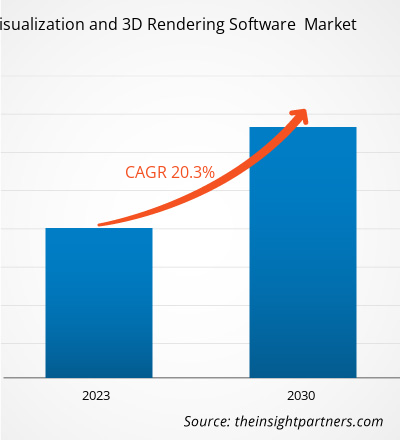[研究报告] 可视化和 3D 渲染软件市场预计将从 2022 年的 26.9 亿美元增长到 2030 年的 118.3 亿美元。据估计,可视化和 3D 渲染软件市场在 2022 年至 2030 年期间的复合年增长率将达到 20.3%。
可视化和 3D 渲染软件市场分析师观点:
可视化和 3D 渲染软件市场涵盖了众多需要逼真视觉呈现的行业和应用。由于技术进步、对沉浸式体验的需求不断增长以及依赖视觉传达的行业的扩张,该市场经历了持续增长。建筑师、室内设计师和城市规划师使用 3D 渲染软件来创建逼真的建筑、室内设计和城市空间可视化效果。这有助于客户理解设计理念并做出明智的决策。例如,Autodesk 的 3ds Max 和 Trimble 的 SketchUp 等软件广泛应用于建筑可视化。电影、动画和游戏行业严重依赖 3D 渲染软件来创造令人惊叹的视觉效果。例如,皮克斯的 RenderMan 用于电影渲染,Epic Games 的 Unreal Engine 用于实时游戏图形。此外,房地产经纪人使用 3D 渲染软件创建虚拟房产导览,让潜在买家可以远程查看房产。Matterport 是一个流行的 3D 房产导览平台。
3D 动画需求的增长、AR 和 VR 技术的进步、3D 内容需求的增长以及 3D 显示设备的增长,正在推动全球可视化和 3D 渲染软件市场的发展。此外,可视化和 3D 渲染软件中越来越多地采用和集成人工智能和机器学习等技术,以提高 3D 内容的准确性,这也促进了市场的增长。预计所有这些因素将在预测期内为市场参与者提供充足的增长机会。
可视化和 3D 渲染软件市场概览:
可视化和 3D 渲染软件工具可帮助用户设计物体的基本三维模型。3D 渲染技术有助于产品设计、实时营销、培训和其他一些功能。全球企业和个人用户正在使用可视化和 3D 渲染软件工具来识别问题区域和需要改进的方面,从而改进运营、提高生产力并优化资源利用率。这些工具广泛应用于以土地为中心的行业,例如工程建筑、制造、运输物流,以及媒体娱乐、医疗保健和教育等其他行业。
自定义此报告以满足您的要求
您将免费获得任何报告的定制,包括本报告的部分内容,或国家级分析、Excel 数据包,以及为初创企业和大学提供超值优惠和折扣
可视化和3D渲染软件市场: 战略洞察

-
获取本报告的主要市场趋势。这个免费样本将包括数据分析,从市场趋势到估计和预测。
可视化和 3D 渲染软件市场驱动力:
对更快、更高效解决方案的需求增长推动了可视化和 3D 渲染软件市场的增长
传统的 3D 模型设计方法既耗时又昂贵。因此,可视化和模拟已成为企业推出新产品的核心因素。
3D 渲染工具在各个垂直行业中都得到了广泛的采用。它们允许用户快速创建逼真的图像、设计原型,并在构建任何内容之前提供完整的空间可视化效果并让用户深入了解。它们还能帮助公司优化可用空间和资源。此外,它们还能帮助公司在打造实际产品之前主动避免错误并确保更好的设计。3D 渲染软件是企业有效的营销工具,因为这些工具可以帮助企业更好地将可用空间可视化,以便更好地进行客户演示和其他活动。
与 2D 或其他模型相比,3D 模型有助于更快地创建虚拟场地或结构,并消除许多错误,从而节省时间。工程师和建筑师可以减少项目设计时间,腾出更多时间完成其他可视化和产品设计任务。此外,专业人员可以提前发现问题,避免重新安排计划或增加预算。
目前,市场上有许多 3D 可视化软件,它们专门针对各个行业和领域的需求而设计。它们能够轻松融入企业现有的工作流程,提供高度逼真的显示效果、实时交互和优化能力。它们还能帮助企业改进整个产品工程流程的设计,并帮助企业提高决策能力。
通过支持动画开发和快速可视化,该软件有助于加速动画、图像处理和图形设计的整个流程。此外,它无需使用额外的模型。所有这些因素都在推动可视化和 3D 渲染软件市场的发展。
报告细分和范围:
可视化和 3D 渲染软件市场根据应用、部署、最终用户和地理位置进行细分。根据应用,可视化和 3D 渲染软件市场细分为训练模拟、营销和广告、视频游戏、产品可视化和建筑可视化。根据部署,可视化和 3D 渲染软件市场细分为本地和云端。根据最终用户,可视化和 3D 渲染软件市场细分为媒体和娱乐、建筑和施工、设计和工程、医疗保健等。根据地理位置,可视化和 3D 渲染软件市场细分为北美、欧洲、亚太地区、中东和非洲和南美洲。
分部分析:
根据部署情况,可视化和 3D 渲染软件市场可分为:
- 本地
- 云
本地部署部分在 2022 年占据了可视化和 3D 渲染软件更大的市场份额,预计在 2022 年至 2030 年期间将实现更高的市场复合年增长率。在本地部署中,硬件和软件均在公司场所安装和维护。本地解决方案为组织带来了显著优势,使他们能够保留所有业务流程和现有内部系统(例如正在使用的制造方法和技术),还可以实施数据安全标准并控制在其限制范围内的整个流程。因此,这些公司更倾向于在自己的监督下实施和维护可视化和 3D 渲染。此外,本地部署主要由有能力投入巨额资金维护这些系统的大型知名公司采用。
区域分析:
可视化和 3D 渲染软件市场大致分为五大区域——北美、欧洲、亚太地区 (APAC)、中东和非洲 (MEA) 以及南美。2022 年,北美占据了可视化和 3D 渲染软件最大的市场份额。该地区的市场增长归因于有利的政府政策和对采用新技术的积极展望等因素。此外,强大的数字基础设施和主要市场参与者为北美可视化和 3D 渲染软件市场的蓬勃发展铺平了道路。此外,该地区拥有世界上最大的媒体和娱乐产业,利用最新的设计和动画工具来制作增强的图形内容。世界上大多数财富 500 强公司都位于该地区,其中包括广泛的设计和研发中心。制造公司在可视化和 3D 渲染工具等设计工具上投入了大量资金,以在市场上提供具有竞争力的产品。此外,庞大的制造业也为北美的物流业提供了补充。物流行业注重优化资源,目前正积极投资先进技术,包括可视化和 3D 渲染工具,以最大限度地利用其仓库设施。
关键参与者分析:
报告中介绍的可视化和 3D 渲染软件市场主要参与者包括 Autodesk Inc、Christie Digital Systems Inc、Dassault Systemes SE、NVIDIA Corp、Chaos Group、Luxion Inc、OTOY Inc、Next Limit、Act-3D 和 Altair 的 Thea Render。
可视化和 3D 渲染软件市场区域洞察
Insight Partners 的分析师已详尽阐述了预测期内可视化和 3D 渲染软件市场的区域趋势和影响因素。本节还讨论了北美、欧洲、亚太地区、中东和非洲以及南美和中美洲的可视化和 3D 渲染软件市场细分和地域分布。
可视化和 3D 渲染软件市场报告范围
| 报告属性 | 细节 |
|---|---|
| 市场规模 2022 | US$ 2.69 Billion |
| 市场规模 2030 | US$ 11.83 Billion |
| 全球复合年增长率 (2022 - 2030) | 20.3% |
| 历史数据 | 2020-2021 |
| 预测期 | 2023-2030 |
| 涵盖的领域 |
By 应用
|
| 覆盖地区和国家 |
北美
|
| 市场领导者和主要公司简介 |
|
可视化和 3D 渲染软件市场参与者密度:了解其对业务动态的影响
可视化和 3D 渲染软件市场正在快速增长,这得益于终端用户需求的不断增长,而这些需求的驱动因素包括消费者偏好的演变、技术进步以及对产品优势的认知度的提升。随着需求的增长,企业正在扩展其产品线,不断创新以满足消费者需求,并抓住新兴趋势,从而进一步推动市场增长。

- 获取 可视化和3D渲染软件市场 主要参与者概述
近期发展:
可视化和 3D 渲染软件市场参与者高度采用无机和有机策略。以下列出了一些近期的关键市场发展:
- 2022 年,Autodesk 宣布收购 Moxion,这家总部位于新西兰的公司开发了功能强大的云端数字每日素材平台,该平台被领先的电影制片人使用。
- 2022 年,捷豹路虎和 NVIDIA 正在重新定义现代奢华,将智能融入客户体验。它还将利用 DRIVE IX 软件堆栈,在车内提供 AI 功能,包括驾驶员和乘员监控以及高级可视化。
- 2022 年,Chaos 和 Enscape 将合并,并获得 TA 合伙人和 LEA 合作伙伴的支持。一家专注于技术的私募股权公司将合并 Enscape,后者是一家领先的建筑、工程和施工实时渲染和设计工作流技术开发商。
- 历史分析(2 年)、基准年、预测(7 年)及复合年增长率
- PEST和SWOT分析
- 市场规模、价值/数量 - 全球、区域、国家
- 行业和竞争格局
- Excel 数据集
近期报告
相关报告
客户评价
购买理由
- 明智的决策
- 了解市场动态
- 竞争分析
- 客户洞察
- 市场预测
- 风险规避
- 战略规划
- 投资论证
- 识别新兴市场
- 优化营销策略
- 提升运营效率
- 顺应监管趋势






















 获取免费样品 - 可视化和3D渲染软件市场
获取免费样品 - 可视化和3D渲染软件市场